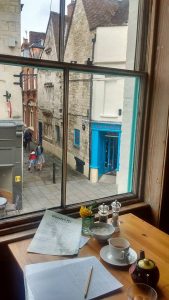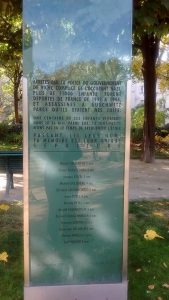This Week’s Bit of String: Language barrier in a cafe
My favourite cafe gets crowded during lunch hour. I managed to grab one of the little tables upstairs, but diagonal to me a woman and her late-teen son and daughter sat on one end of a longer wooden table while an older couple sat with their little granddaughter on the other end.
The grandparents only spoke French. They were visiting their bilingual granddaughter. The woman opposite could speak very little but English.
This did not stop her talking to her unknown tablemates. First she noted that she and the elderly Frenchwoman had the same colour iPhone case. ‘Rose gold. Rosé?’ Ah, the transcendent powers of technology.

Then she did her best to tell the couple about the local village where she and her children lived. ‘It’s very old, very pretty—yes, jolie? It’s jolie, I think? And hills, lots of hills. Mond, montes? Hills?’
It occurred to her that if only her sister were around, the difficulty would be solved. ‘My sister—ma soeur—she speaks—how do you say speaks in French? How do you say fluently?’
And on like this for some time. She felt the need to convey to them, battering against the language barrier, that her mother had first become a grandmother at a younger age than the woman herself now was.
I started to wonder whether the woman was just desperate not to talk to her own children, who sat politely, murmuring hopeful foreign phrases to bolster her floundering. Why was it necessary to tell the French couple these things? Surely France has hilly villages. Surely it has young grandmothers. We already see it has rose gold iPhone cases.
Women in Translation
August is Women in Translation Month, raising awareness of women who write in other languages, and women who bridge the gap between us. Just this year I’ve read three books written and translated by women: Ludmila Ulitskaya’s The Big Green Tent (translated from the Russian by Polly Gannon), The Queue by Basma Abdel Aziz (translated from the Arabic by Elisabeth Jaquette), and Human Acts by Han King (translated from Korean by Deborah Smith).
All three of these books were excellent, telling memorable tales in haunting voices. The stories they told were distinctive to their countries. They were slices of history or current events. I felt better educated by each, and not a little fortunate to live in a nation with small problems in comparison.
In other words, I was reading about our differences. Some of the issues described in each book: relationships, job insecurity, health problems—are human problems we all deal with, but they were sharply twisted by the different type of political chaos in each case.
So I wondered, what about our similarities? Are those worth talking about sometimes?
Translation Pre-Requisites
Translated works are subject to the whims of the market, as much as other books are. Jade Boyd, who earned her Masters in translation at the University of Bristol, reminded me when I asked about the process that usually a book would first be successful in its native language before its publishers invest in translation.
This means that a translated book must first meet the standards all our books are (theoretically) held to. I summed them up a few weeks ago, but to echo that again: a striking setting, unique voice, and original hook are important.

With the translated books I’ve read recently, the author’s nationality and culture were pivotal in achieving those three essentials. So it’s not surprising, really, that different stories are the ones being told.
And as I said before, that’s a good thing. We want to hear new stories, to learn other histories, and we certainly want them told in their Own Voices. But while we seek out differences, we must not be blind to similarities, or to perceptions. Jade enlightened me about the concept of habitus: ideas and dispositions conditioned by our surroundings and upbringing, which influence how we interpret things.
Translators are trained to be aware of their own habitus as they work. I doubt the mass markets are, though. Was a South Korean tale of rebellion and the breakdown of societal structure big news because it contradicts our stereotypes of the region? Was The Queue a successful import because it portrays secular Middle Eastern protagonists more than Muslim ones?
We should watch for the influence of habitus as we venture into foreign literature. When we read about struggles in distant lands, let’s consider whether we prefer characters to be quite different from us, perhaps so we can tell ourselves it would never happen here. Is that healthy, or realistic? Is it interfering with our ability to empathise?
For more reading during Women in Translation month and beyond, there are great recommendations in this Women Writers Network chat, and on Rita Gould’s blog. You can follow the WITmonth hashtag on Twitter, and there’s also this fascinating insight into translation from Lucy North on Bookwitty.
Many of those offerings look intriguing and wonderful. My next stop, however, might be Asleep or The Kitchen, by Banana Yoshimoto. Their blurbs don’t play up foreign settings, but rather present stories of relationships and inner turmoil that might end up being surprisingly recognisable. Something a little similar for a change.
Happy explorations, everyone!
Excellent questions! The books I chose for #WITmonth were ones that received a lot of “buzz”, but I found more than one seemed to focus on governments crushing dissent! I don’t doubt serious topics warrant attention (and garner interest from those of us who live in relative safety), but it was a relief to read Kitchen by Banana Yoshimoto after such grim reading.